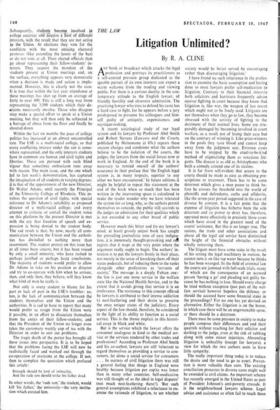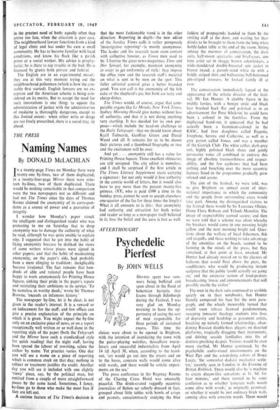Litigation Unlimited?
THE LAW
By R. A. CLINE
A recent sociological study of our legal system and its lawyers by Professor Abel Smith and Robert Stevens (Lawyers and the Courts, published by Heinemann at 63s.) repeats these ancient charges and condemns what the authors believe to be the isolation of the courts, the judges, the lawyers from the social forces now at work in England. At the end of the book it is necessary to remind oneself of the authors' assurance in their preface that 'the English legal system is, in many respects, superior to any other we have encountered.' In future editions it might be helpful to repeat this statement at the end of the book when so much that has been written in the intervening space is calculated to make the reader wonder why we have tolerated the system for so long, why, as the authors permit themselves to concede, the public still accords to the judges an admiration for their qualities which is not extended to any other breed of public service.
However much this bitter and (to my lawyer's mind, at least) grossly unjust book has caught the prevailing journalistic tone of easy indigna- tion, it is immensely thought-provoking and otlt regrets that it stops at the very point where the argument really ought to begin. The authors' in- tention is to put the lawyers firmly in their place, not merely in the sense of knocking them off their status pedestals, but of reducing them to the ranks alongside other professions as 'servants of society.' The message is a deeply Fabian one : the law is just one more service in the welfare state like the National Health Service, and to the extent that it avoids giving that service it is an irrelevance. The resistance to this concept offered by lawyers is attributed to their intense addiction to nest-feathering and their desire to preserve the once unique status of the judiciary. Every aspect of the law should, therefore, be considered in the light of its ability to function as a social service. This is the theme implicit in this histori- cal essay in black and white.
But is the service which the lawyer offers the consumer analogous in kind to the medical ser- vice or the services rendered by other trades and professions? According to Professor Abel Smith and his co-author, lawyers are still 'reluctant to regard themselves as providing a service to con- sumers, let alone a social service for consumers . . . In matters of civil litigation there was still a general feeling that things in England were healthy because litigation per capita was lower than in many other countries. Self-medication was still thought of as the ideal in legal disputes' (not much nest-feathering there!). 'But such general assumptions exhibited a reluctance to ex- amine the rationale of litigation, to see whether society would be better served by encouraging rather than discouraging litigation.'
I have found no such reluctance in the profes- sion to examine the basic assumption and having done so most lawyers prefer self-medication to litigation. Contrary to their financial interests both solicitors and barristers frequently advise against fighting in court because they know that litigation is, like war, the weapon of last resort which ought not to be freely used. Litigants are not themselves when they go to law, they become obsessed with the activity of fighting to the detriment of their normal lives. Some are irre- parably damaged by becoming involved in court warfare, as a result not of losing their case but on the contrary of winning it. Like prize-winners in the pools they taste blood and cannot keep away from the judgment seat. Extreme cases have to be stopped by the cruel-to-be-kind method of stigmatising them as vexatious liti- gants. The disease is as old as Aristophanes who built a comedy around one of its victims.
It is far from self-evident that access to the courts should be made as easy as obtaining pre- scriptions or treatment. There has to be some deterrent which gives a man pause to think be- fore he crosses the threshold into the world of plaintiffs and defendants, oaths and affidavits, like the seven-year period suggested in the case of divorce by consent. It is a fair point that the expense of litigation has hitherto been the sole deterrent and its power to deter has, therefore, operated more effectively in precisely those cases which have stood in the greatest need of the courts' assistance. But this is no longer true. The unions, the trade and other associations and above all the legal aid service have diminished the height of the financial obstacles without wholly removing them.
The litigant must have some stake in the result of his setting the legal machinery in motion; he cannot turn it on like tap water because he thinks he has been wronged. In the field of criminal law the courts are jammed with full-scale trials, many of which are the consequence of an accused person 'having a go' and pleading not guilty be- cause he has nothing to lose. Should every charge be tried without exception (just part of the wel- fare service) however hopeless the defence, or should the accused have some financial stake in the proceedings? For no one has yet devised an alternative. Either the litigation is on the house, in which case there will be an ungovernable spree, or there should be a deterrent.
There must be some pressure in society to make people compose their differences and end their quarrels without reaching for their solicitor and dashing to the judge, even at the risk of rubbing along with some minor injustices. Abounding litigation is unhealthy (except for lawyers), a view for which the two authors seem to have little sympathy.
The really important thing today is to reduce the desire and the need to go to court. Preven- tion is more valuable than cure. The existing conciliation processes in divorce cases might well be extended to civil claims. An important scheme has recently emerged in the United States as part of President Johnson's anti-poverty crusade. It is the neighbourhood lawyers scheme. Legal advice and assistance so often fail to reach those in the greatest need of both; equally often they arrive too late, when the situation is past cure. The neighbourhood lawyer functions from a kind of legal clinic and has under his care a small community. He has to become familiar with local conditions, and know his flock like a parish priest or a social worker. His advice is prophy- lactic; he is there to nip trouble in the bud. He is financed by grants both private and federal.
The English are in an experimental mood: they are at this very moment trying out the neighbourhood policeman (which is how the con- stable first started). English lawyers are no ex- ception and the American scheme is being con- sidered on its merits. But to accept the need for such innovations is one thing; to equate the administration of justice with the administration of medicine is thoroughly dangerous, except to this limited extent: when either writs or drugs are too freely prescribed, there is a social trag_dy ahead.



































 Previous page
Previous page